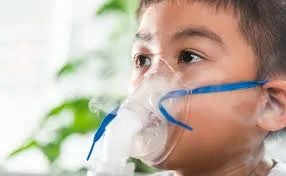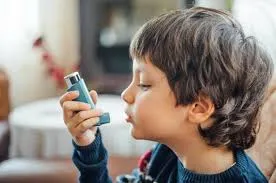
Managing childhood asthma is essential for ensuring a child’s well-being, especially in New Jersey, where factors like air pollution and seasonal allergies can trigger symptoms, so this guide provides the best strategies for preventing asthma attacks, recognizing common asthma triggers, and ensuring effective asthma treatment for kids.
Understanding Childhood Asthma
Childhood asthma symptoms occur due to a respiratory tract infection, either due to certain viruses or due to sensitization during certain seasons such as spring, especially in cities like Newark and Jersey City, where living with childhood asthma can be challenging, and the infection can be noticed through some of the following signs:
- Severe coughing.
- Increased respiratory rate.
- Blue discoloration of the body due to lack of oxygen.
- Sharp breathing episodes, increasing at night.
Complications of childhood asthma
In some children, asthma can flare up, causing some of the following complications:
- Sleep disturbance.
- Persistent shortness of breath.
- Asthma may affect your child’s daily activities, which may prevent or limit some of them.
- Exposure to the long-term side effects of asthma treatments needed to stabilize your child’s condition.
Best Practices for Managing Childhood Asthma
Parents can help their children prevent or cope with asthma attacks with some useful mindful practices, the most important of which are the following:
Identify and Avoid Common Asthma Triggers
Common asthma triggers in New Jersey include:
- Pollen and Seasonal Allergies: Spring and fall months bring high pollen levels.
- Air Pollution: Urban areas may have higher pollution, worsening childhood asthma symptoms.
- Mold and Dust Mites: Regular cleaning helps manage indoor allergens.
- Pet Dander: If a child is allergic, limit exposure to household pets.
Follow a Personalized Asthma Action Plan for Children
A pediatrician can create a personalized asthma action plan for children, which includes:
-
- A schedule for asthma medications for children
- Steps for recognizing worsening symptoms
- Emergency contact information and action steps
Use Asthma Medications for Children as Prescribed
Two main types of asthma treatment for kids include:
-
- Long-term control medications (e.g., inhaled corticosteroids)
- Quick-relief inhalers for immediate symptom relief
Monitor Symptoms and Lung Function
Tracking childhood asthma symptoms helps detect potential flare-ups early. Parents can:
- Keep a symptom diary
- Use a peak flow meter to measure lung function
Encourage a Healthy Lifestyle
- Engage in physical activity with caution.
- Maintain a nutritious diet to strengthen the immune system.
- Ensure a regular sleep schedule to prevent fatigue-induced asthma attacks.
Managing Asthma in Schools
Teachers and school staff should be aware of your child’s asthma action plan. Parents should:
- Inform the school nurse about their child’s condition.
- Ensure quick access to asthma medications for children.
- Educate children on self-care strategies.
Teach your child how to deal with asthma attacks on their own
One of the most important elements of asthma education for families is instructing parents to make the child aware of the following practices in case he has an asthma attack and a parent is not by his side.
- Stay calm: Anxiety can worsen breathing problems.
 Use their quick-relief inhaler: If they have one, take the prescribed dose.
Use their quick-relief inhaler: If they have one, take the prescribed dose.- Practice controlled breathing: Slow, deep breaths can help reduce panic.
- Sit in an upright position: This helps open the airways.
- Move to a well-ventilated area: If indoors, go near an open window.
- Seek help immediately: Call 911 or find a responsible adult.
How Asthma is Diagnosed in Children
The doctor reaches a diagnosis of asthma in a child after performing a lung function test, where he can see the amount of oxygen during inhalation and exhalation.
The doctor may have some difficulty diagnosing a child with asthma if wheezing is present, as it is common in children.
Why Choose Fayrouz Pediatric Care for Asthma Treatment in New Jersey?
At Fayrouz Pediatric Care, we provide asthma evaluation and treatment, which includes:
- Comprehensive asthma assessments
- Personalized asthma action plans for children
- Specialized asthma education for families
- Advanced diagnostic tools for managing asthma in schools and at home
Managing childhood asthma requires a proactive approach, from avoiding common asthma triggers to ensuring access to asthma medications for children. By following these best practices, parents in New Jersey can help their children lead healthy, active lives.
FAQ
What are the early warning signs of asthma in children?
Look out for coughing, wheezing, and breathing problems. Chest tightness and feeling tired are also signs. Catching these early helps get help fast.
Are there safe alternative treatments for asthma in children?
Some alternative treatments can be beneficial for treating asthma, including herbal remedies such as fish oil and black seed, structured breathing techniques such as Buteyko and yoga, and relaxation techniques such as meditation and progressive muscle relaxation.
What strategies can I implement at home to reduce asthma triggers?
Make your home asthma-friendly by reducing allergens like dust mites and pet dander. Clean well, use air filters, and keep humidity right.